What is walking football and how can it be helpful for people with arthritis?
16 July 2024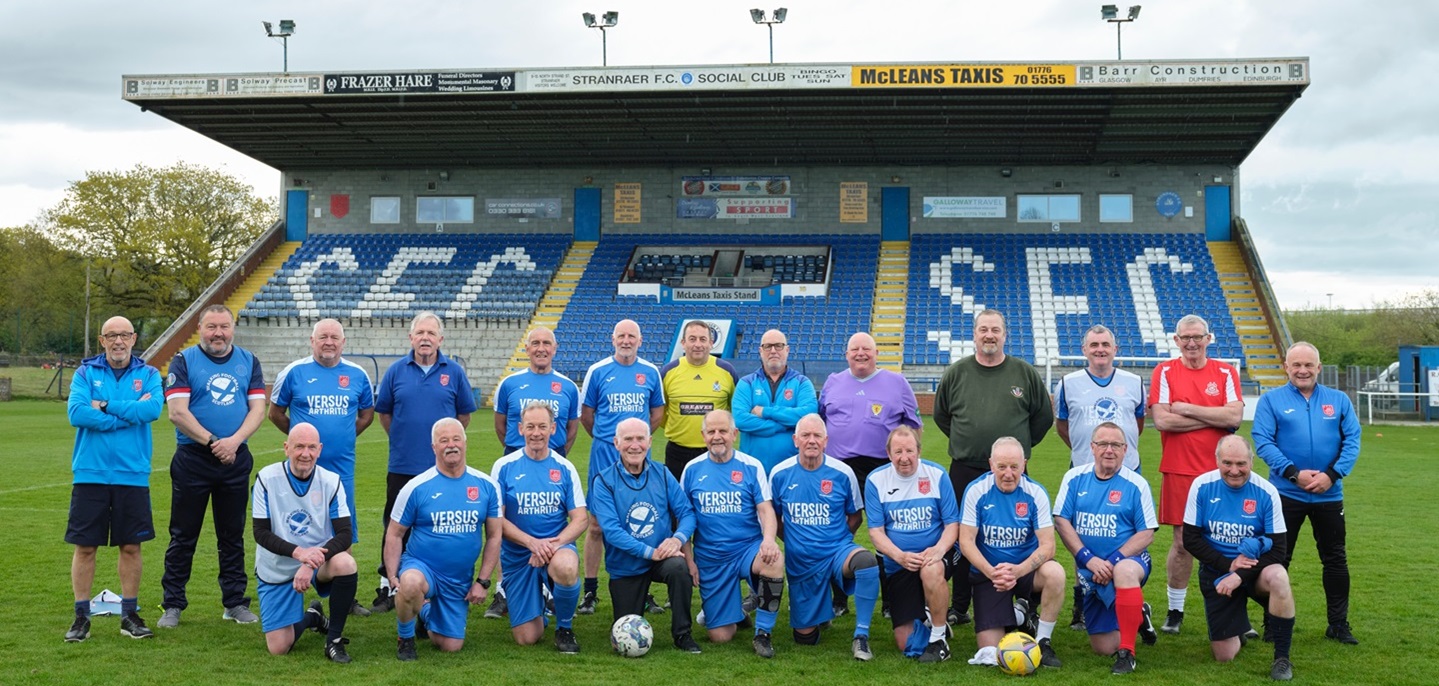
Staying active can be hugely beneficial in managing arthritis pain and symptoms.
If you’re looking to get more movement in your life, you may not have thought of playing a sport called walking football.
Walking football is very similar to the football you will already know. The main difference is that the game is played at walking pace and no contact is allowed, making it a great option for people who have arthritis.
In partnership with Alzheimer Scotland, Versus Arthritis runs a walking football group in Stranraer, Scotland. Many of the participants have arthritis and have found the sport to be very beneficial.
We spoke to some of the players and organisers to find out more.
What is walking football?
“Walking football is a beautiful game,” says Jim Paterson, Scottish walking football association representative. “It’s all about player care and looking after the players.
“In Scotland, you’re allowed a maximum of three touches at any one time, no physical contact whatsoever and no running.”
Walking football is played on small pitches with small goals. It can be played indoors or outdoors.
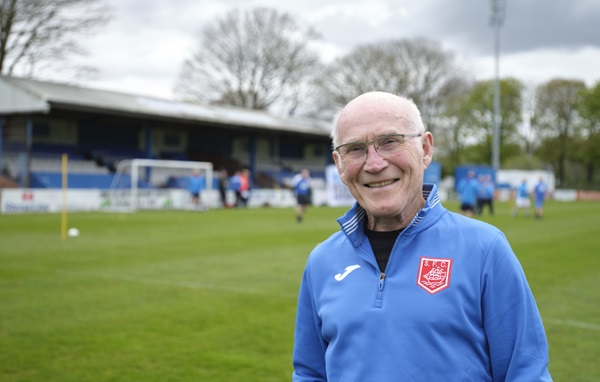
Games are normally six-a-side. Like in five-a-side games, the ball must not go over head height and all free kicks are indirect. There is also no heading of the ball.
John, who is 85 and has osteoarthritis of the knees, plays in the Versus Arthritis group in Stranraer. The exercise has really helped while he waits for knee replacement surgery.
“The rules really limit injuries,” says John. “The chances of being injured are really quite low. There is no running or physical contact, and we play three-touch football which gives a more level playing field for players of varying abilities.”
What are the benefits of walking football?
There are lots of benefits to playing walking football:
- Regular exercise can help improve muscle strength which keeps your joints strong and well supported.
- Staying active can help you to maintain a healthy weight.
- Taking part in a fun hobby might offer a positive distraction from pain and fatigue.
- Joining a group can help you meet people in your local area and feel more connected to the community.
- Physical activity can improve your mental health and balance your mood.
“Being active is one of the best things you can do to manage arthritis symptoms,” says Gary, who runs the Versus Arthritis walking football group in Stranraer.
“Physical activity not only improves joint function, reduces disease activity and improves cardiovascular health, but can also help with pain management and mental wellbeing.”
Rachel, who works as an MSK practitioner in Scotland, says sports like walking football are great for rehabilitation.
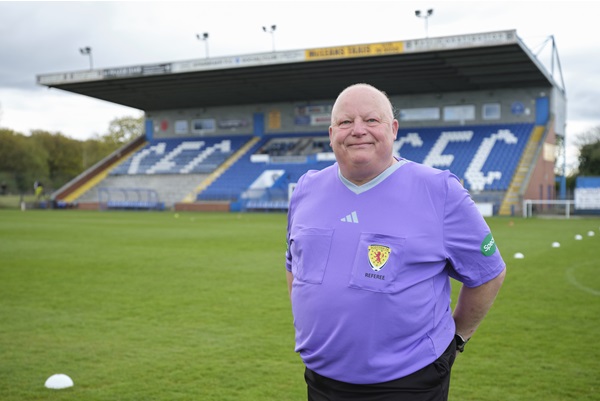
“Within my role I see a lot of people come to me with osteoarthritis, particularly knee and hip arthritis,” says Rachel. “This group is great to get them involved and to continue with their rehab. The physio is only the beginning!”
Mark, 64, who has osteoarthritis and is waiting for a total knee replacement, plays in the group as the referee.
“The football has been helping tremendously to ease the pain,” he says. “If you’ve got pain, the last thing you want to do is exercise, but it’s helped.”
The social side of walking football
Being active in your community and meeting like-minded people can be great for your mental health.
John says the social aspect of the walking football group has helped him to stay positive.
“My wife died about a year ago and I lost confidence a bit and didn’t go out very much,” he says. “Walking football has helped to lift my mood.”
“All the boys get so much out of meeting after the football and the WhatsApp is always popping off.”
Who can benefit from walking football?
Walking football is a sport that welcomes people of all levels and abilities. The rules allow the game to be played safely for those in older age groups.
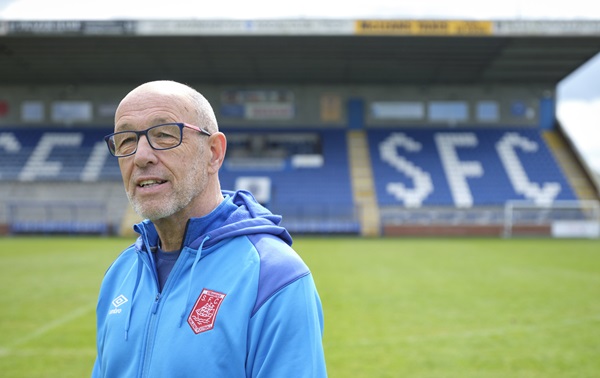
Greg, 70, who has osteoarthritis and plays in the Versus Arthritis walking football group, says, “walking football has been a great part of my life. I’ve played football since I was a boy, so I’m really enjoying playing with guys I played against 50 years ago.”
A player with less experience of football is retired GP Simon, 62, who has osteoarthritis and spondylolisthesis.
“I’d never played football myself,” says Simon. “But knowing from my career the health benefits of exercise, I thought I’d come along.
“If you can walk, stop a ball and pass, then get involved.”
What do I need to bring to walking football?
Walking football doesn’t require much kit, making it a low-cost way to exercise.
If you are thinking of attending a walking football group, all you need to bring with you is:
- Some clothes you are comfortable moving around in.
- A comfortable and supportive pair of shoes.
- Plenty of water to stay hydrated.
- A towel and change of clothes if you want to shower afterwards.
If you are playing outdoors, make sure to be mindful of sun exposure and protect your skin.

How can I adapt walking football to work for me?
While walking football is already adapted from football to reduce the intensity and likelihood of injuries, like any exercise it can still be adapted to work for you.
If you’re concerned about the impact of walking football on your arthritis, you could try:
- Playing in positions that require less movement, such as in goal.
- Starting off slowly and moving at a pace that works for you.
- Stretching before, during and after games.
- Taking a rest between games or not taking part in every single game.
- Speaking to a fitness professional or physiotherapist for more advice.
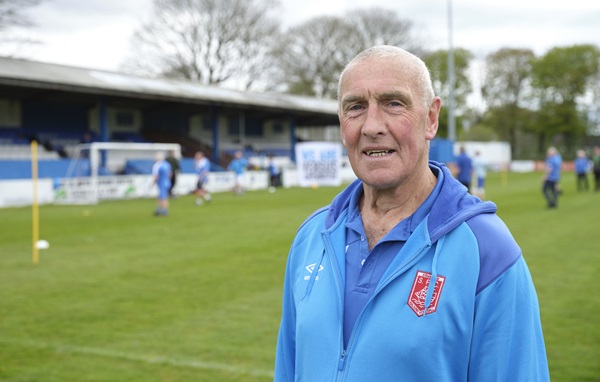
Bobby, who is 74 and plays in the Versus Arthritis walking football group in Stranraer, had his first knee replacement last year and is waiting for his second. While waiting for surgery he hasn’t been able to play walking football to his normal ability, but still enjoys taking part.
“I’ve gone back to walking football, but my game is limited,” he says. “If you’re concerned about doing too much movement, you could try playing in goal.”
If you aren’t feeling up for playing walking football, there’s always the option of cheering on your teammates or simply joining afterwards for a coffee.
“It’s a great day out. You can’t help laughing when you come. It just seems brighter afterwards.”
Get involved in walking football
If you would like to find out more about walking football and get involved in a group in your area, more information can be found below.
Find out more about Walking Football in EnglandFind out more about Walking Football in Wales
Find out more about Walking Football in Scotland
If you live in Northern Ireland, you can find out more by emailing David Lemon at squeezy.lemon@btinternet.com.
If you run a walking football group and would like to learn how to become more arthritis friendly, we would love to hear from you. Please email us at letsmove@versusarthritis.org.
Staying active with Versus Arthritis
If you would like to find more ways to stay active, why not try:
- Let’s Move with Leon, a 12-week programme which offers 30-minute movement sessions, designed to help you improve mobility, posture, balance, cardiovascular and respiratory fitness and strength.
- Joining the Let’s Move Facebook group, a space where people share their experience of staying active when living with arthritis.
- Tracking your progress with the Versus Arthritis free physical activity planner.